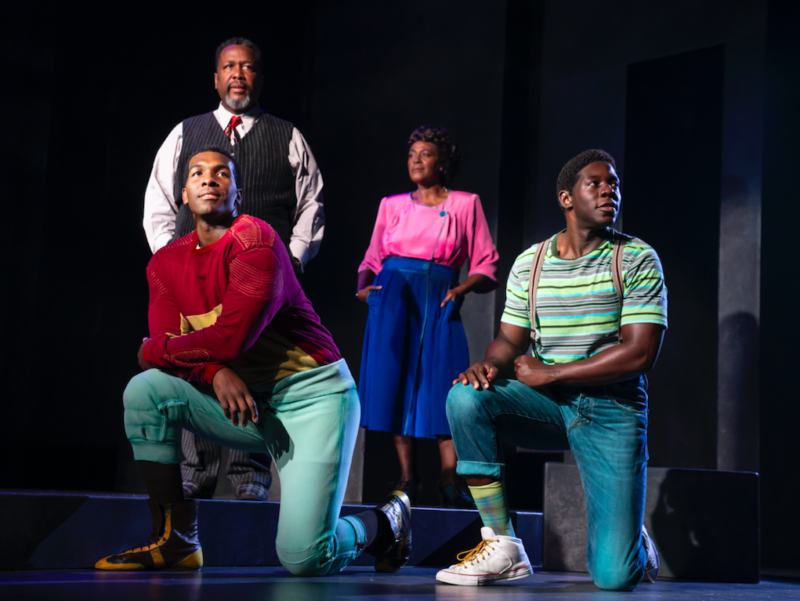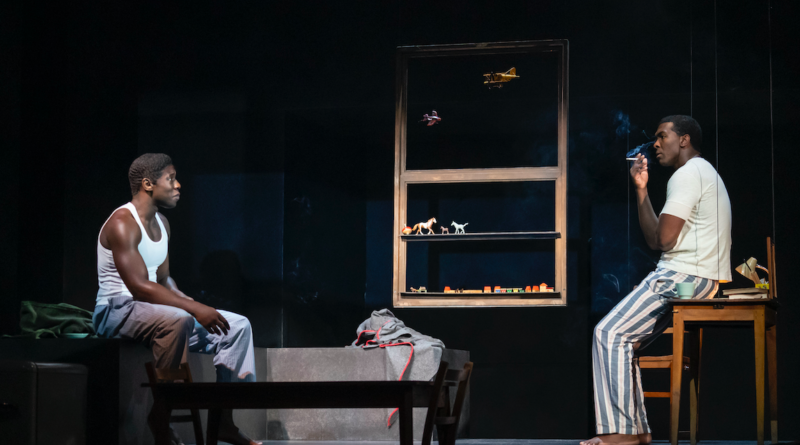INTERVIEW: McKinley Belcher III on bringing new life to ‘Death of a Salesman’
Photo: Death of a Salesman stars McKinley Belcher III and Khris Davis. Photo courtesy of Joan Marcus / Provided by DKC O&M with permission.
Death of a Salesman, the classic Arthur Miller play, is currently being revived at Broadway’s Hudson Theatre in a production directed by Miranda Cromwell. In this historic staging, the Loman family is brought to life by a cast of Black actors, giving the audience the chance to experience this iconic drama from the perspective of an African American family in the mid-20th century. The cast features Wendell Pierce (The Wire) and Sharon D. Clarke (Caroline, or Change) as Willy and Linda Loman, and their children on stage are played by Khris Davis (Biff) and McKinley Belcher III (Happy). Tony winner André de Shields is Uncle Ben.
Belcher is an accomplished actor who has appeared on stage numerous times, in addition to portraying many engaging roles on TV and film. Audiences can catch him in Netflix’s Ozark, Showtime’s The Good Lord Bird and HBO’s We Own This City. His previous stage credits include everything from MCC Theater’s The Light to Roundabout Theatre Company’s A Soldier’s Play.
The actor’s introduction to Miller’s text came many years ago, when he was a student in high school, and he remembers feeling a deep connection with the characters. In the play, Willy Loman, the father, struggles with his professional aspirations, and he can never seem to capture that ever-elusive American dream. Eventually his family life and professional struggles clash with each other, and this salesman feels stuck in perilous quicksand.
“My introduction to the play is like many people,” Belcher said in a recent phone interview. “I read it in high school, and I felt very connected to a lot of the dynamics that I was seeing between fathers and sons, and wanting to define yourself, and feeling tethered or anchored to other people’s expectations of who you should be. But more specifically to this production, I did a benefit reading for the Arthur Miller Foundation I want to say it must have been 2016-2017, somewhere around there, and we just did a couple scenes from the play. It was around the same time they were doing The Crucible. If I’m not mistaken, we did it on their set. We did a couple scenes from the play, and they cast it as a Black family.”
Belcher said he remembers having a lot of fun with that reading, but it was a one-night-only engagement, so he moved on with his career. Then, six or seven years later, he received a phone call with the producers of this revival asking him whether he was interested in further exploring the Happy Loman character.
“I was floored,” he admitted. “It has felt like a huge blessing to me and an opportunity to not only make history, but to stretch the edges of what is possible for people who look like me. And there’s something about telling these stories on Broadway that to me is a way of saying this is important. And I’m really proud that, in a way, we’re saying not only is this a beautiful piece of writing and a classic American play … but we’re saying families that look like me and are wrestling with the American dream — their journey, their struggle, their love — is important, and that’s exciting to me.”
When Belcher landed the part for this Broadway transfer (Pierce and Clarke previously portrayed their characters in London’s West End), he kept reading the play over and over again, and he was constantly struck by Happy’s yearning for attention and his vying for his family’s love, specifically his father’s love.
“The more we worked in rehearsal and the more I looked at the text, the more I was sure there was a deep yearning there and deep need for validation and approval,” said Belcher, whose résumé also includes the film The Art of Racing in the Rain. “I think in many ways that’s the driving force in my interpretation of Happy. I also think if you’re going to do the play this way, and you’re going to do it with a Black family, it’s very important for me as an artist to employ all the things that come into play in the 1940s and ‘50s for a Black man my age. So it was very important to me to listen to jazz and to think about what his influence would be and the sounds he was hearing. … I was really trying to find ways of employing that in how I approach the language as Happy and letting that buoyancy and joyful panache live in his body as well. Much of that came with workshopping things physically in rehearsal, but a lot of it is me thinking about what the influences are, what are you hearing in terms of your faith, what are you hearing in terms of popular music. Are you into jazz? What are you seeking and not getting?”
When experiencing Death of a Salesman on Broadway — and audience members should hurry because the limited engagement closes Sunday, Jan. 15 — there’s no denying that there’s a real family feeling on that stage. The Lomans are loving, struggling, breaking apart and striving to thrive. That authenticity of having a group of actors come together and feel like a family is a direct result of the rehearsal process with Cromwell.
“I feel like I was very grateful to Miranda Cromwell, our director, because she took the very first rehearsal — and we started toward the end of July — and it was only the Loman family in the rehearsal, so Linda, Billy, Biff, me Happy, and Ben toward the end of that week,” Belcher said. “And that time was invaluable because it gave us a chance not only to get to know each other a little bit, but to really focus in on finding common ground and where we are as a family and to decide those things as a unit. I feel like I got to know them a lot that first week, and some of it is a thing that you can’t measure or you can’t even really explain.”
As one example, Belcher pointed to his working relationship with Clarke: “I have a very special relationship with Sharon. In many ways, it is probably the biggest blessing or gift from this production. I truly love her. It is the thing that happens every now and then with a production where you meet someone who, for whatever reason — sometimes it’s personality and perspective, sometimes it’s timing, like where you are in your life — and you know that you’ll be connected to them for the rest of your life. I feel very grateful that I have Sharon in my life now because having her in my life enriches not only my life as an artist and on stage, but as a human. I feel very grateful for that because it’s very special.”
Similarly, Belcher’s relationship with Davis is several years in the making. The two appeared at Lincoln Center in The Royale several years ago. Davis played a boxer, and Belcher played his protege. “So in many ways we’ve been laying the groundwork to play brothers for many years now,” he said. “So there’s a shorthand that you develop after working with someone a couple times and a trust that is hard to find in a short amount of time, so I’m grateful that a lot of that lives in how he and I interpret Happy and Biff and how we interact with each other.”
By John Soltes / Publisher / John@HollywoodSoapbox.com
Death of a Salesman, featuring McKinley Belcher III, continues through Sunday, Jan. 15 at the Hudson Theatre on Broadway. Click here for more information and tickets.


